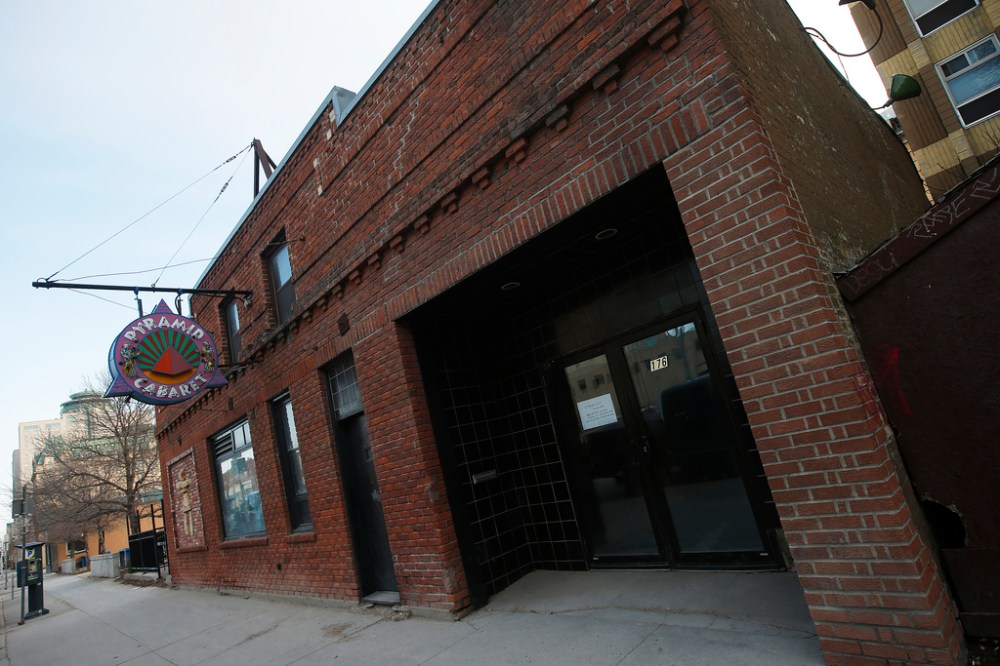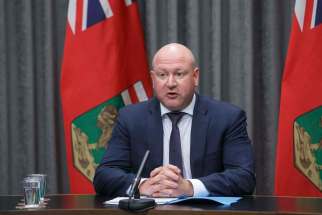Miserly Tories push business owners over edge
Read this article for free:
or
Already have an account? Log in here »
To continue reading, please subscribe:
Monthly Digital Subscription
$0 for the first 4 weeks*
- Enjoy unlimited reading on winnipegfreepress.com
- Read the E-Edition, our digital replica newspaper
- Access News Break, our award-winning app
- Play interactive puzzles
*No charge for 4 weeks then price increases to the regular rate of $19.00 plus GST every four weeks. Offer available to new and qualified returning subscribers only. Cancel any time.
Monthly Digital Subscription
$4.75/week*
- Enjoy unlimited reading on winnipegfreepress.com
- Read the E-Edition, our digital replica newspaper
- Access News Break, our award-winning app
- Play interactive puzzles
*Billed as $19 plus GST every four weeks. Cancel any time.
To continue reading, please subscribe:
Add Free Press access to your Brandon Sun subscription for only an additional
$1 for the first 4 weeks*
*Your next subscription payment will increase by $1.00 and you will be charged $16.99 plus GST for four weeks. After four weeks, your payment will increase to $23.99 plus GST every four weeks.
Read unlimited articles for free today:
or
Already have an account? Log in here »
Hey there, time traveller!
This article was published 20/10/2020 (1875 days ago), so information in it may no longer be current.
The Pallister government’s failure to provide financial support to businesses affected by the latest COVID-19 shutdown is surprising, considering the province’s bottom line for 2020-21 is expected to be much rosier than projected.
This week, the province mandated the shutdown of some licensed facilities in Winnipeg and further restricted operations of restaurants. The move was in response to growing COVID-19 infection rates in the city and a steady increase in hospital admissions. But unlike other provinces that imposed similar closures this month to deal with the pandemic’s second wave, the Pallister government did not announce financial support.
The Quebec government, by contrast, immediately announced $100 million in financial aid for businesses (including bars and restaurants) forced to close their doors this month under a 28-day shutdown. Businesses there are eligible for 80 per cent of their fixed costs — such as rent and utilities — up to a maximum of $15,000.

The thinking in Quebec is that if businesses are forced to close temporarily for the greater good of society, they should be compensated for their losses. But not in Manitoba, where bars and restaurants — some of which are facing insolvency — have received no such support.
The provincial government has the means to help. While it is facing a $2.9-billion deficit this year as a result of the pandemic, the shortfall is lower than original estimates of $3 billion to $5 billion. The deficit could even come in under $2.9 billion.
For starters, some of the financial aid packages announced by the province earlier this year (including the $120-million Manitoba Gap Protection Program) are undersubscribed. There’s still money left in those budgets that could be redirected to businesses hurt by the recent shutdown.
Not all cash spending on COVID-19 this year will be accounted for in this year’s books, either. For example, spending on personal protective equipment is assigned to the fiscal year in which it’s used, not when it’s purchased. Most capital spending is also not an in-year accounting expense; it’s amortized over the useful life of the asset. That doesn’t change the deficit projection. But it does point to the province’s strong liquidity position, which includes the government’s rainy day fund.
Also, the $2.9-billion projected deficit excludes hundreds of millions of dollars announced over the summer by the federal government. Manitoba is eligible for an estimated $418 million from Ottawa’s Safe Restart Agreement and another $85 million from its Safe Return to School aid package. That’s $500 million that hasn’t been accounted for. Some of that should be used immediately to support affected businesses.
All governments in Canada are facing large deficits this year as a result of COVID-19. Manitoba is no exception. That doesn’t mean governments should use the pandemic as an excuse to abandon fiscal responsibility. They should scrutinize expenditures more closely than ever. But doing so means ensuring support is provided where it’s needed most to avoid further damage to the economy. Failure to do so could drive up bankruptcies and job losses, and result in greater government spending down the road in areas such as unemployment support, health care and mental health.
The Manitoba government’s finances are in better shape than earlier thought. In the province’s fiscal and economic update in June, Manitoba Finance projected its debt as a percentage of GDP would rise to 41 per cent under a so-called V-shaped economic recovery (a strong rebound in the second half of the year). Using the same economic growth assumptions, Manitoba Finance is currently forecasting a 37 per cent debt-to-GDP ratio (one of the key indicators credit rating agencies consider). That’s not much higher than the pre-pandemic level of 34 per cent. It’s high by Manitoba historical standards, but considering the economic context, it’s entirely manageable.
Providing financial support to businesses affected by the recent shutdown would have virtually no effect on the province’s debt-to-GDP ratio. In fact, if the money were to be redirected from existing undersubscribed programs, or from new federal funding, it would have no effect at all.
The Pallister government should do the right thing and announce immediate support for those whose livelihoods hang in the balance.
tom.brodbeck@freepress.mb.ca

Tom has been covering Manitoba politics since the early 1990s and joined the Winnipeg Free Press news team in 2019.
Our newsroom depends on a growing audience of readers to power our journalism. If you are not a paid reader, please consider becoming a subscriber.
Our newsroom depends on its audience of readers to power our journalism. Thank you for your support.








